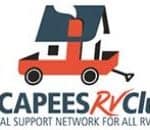Can you afford the RV lifestyle?
You can find out with our RV budget lifestyle calculator!
Some people assume the RV lifestyle is reserved for the independently wealthy. Others assume it’s a devil-may-care, throw-caution-and-dollar-bills to the wind sort of life. In reality, it’s somewhere in the middle.
RVers have basic bills like everyone else. For a more thorough explanation of RV budgeting, please see our Checklist and Page on the RV Lifestyle Budget.
How Our RV Budget Calculator Is Organized
Our Budget Calculator is broken up into three sections:
Bills
These are the routine, necessary and generally fixed monthly payments for basic housing and utilities. Mortgages, loan payments, and rental fees generally fall into this category. Bills tend to remain constant on a monthly basis.
Insurance
Insurance premiums are part of the modern American lifestyle. Some, such as auto insurance, are required by law. Others, such as an RV insurance and health insurance, are recommended for the safety of your family.
Expenses
Expenses are those costs which, to a certain degree, can be increased or decreased on a monthly basis.
- They include “required” categories such as fuel, auto repair and groceries
- And “discretionary” categories such as entertainment and club memberships.
How to Reduce My RV Living Expenses?
Scroll below the calculator to learn more about how to reduce RV living expenses!

*ALERT!*
As of January 8, 2024, this interactive RV calculator is temporarily suspended. We apologize for the inconvenience, and we hope to have the calculator back up and running soon. In the meantime, we recommend reading through the rest of the notes on this page, which may help clarify your understanding. Thank you for visiting Changing Gears.
Tips to Reduce RV Lifestyle Expenses
If the calculator suggests your income won’t match your living expenses, here are some ideas for frugal long-term RVing.
1. Avoid High-Priced Campsites
Campsite reservations are usually the largest expense in most RV budgets. If you spend a night here, a night there, paying for Full Hookup sites, then campground fees can easily match (or double) the cost of a monthly mortgage payment!
Here are a few ideas for reducing your reservation and housing expenses.
- Dry camp more! You can find free overnight parking and boondocking locations all over the country. Visit our Where to Go Boondocking? compendium for a list of hundreds of places!*
- Stay longer. Most campgrounds offer significant discounts for weeklong or monthlong reservations.
- Avoid tourist hotspots. Just as hotels on a beachfront cost more, so do campsites.
- Stick to government campgrounds. You can often find affordable partial hookup campgrounds in the federal and state park networks.
*Boondocking isn’t really free, but it is cheap! You have to pay separately for showers, dump stations or a composting toilet, and you’ll need to upgrade your onboard electrical system to cope with the extra demand.
- It may sound strange, but sometimes paying more for memberships can cut down on your total housing costs! Programs like Harvest Hosts and Thousand Trails offer members exclusive free or cheap locations in exchange for an annual subscription. Usually, the memberships pay for themselves if you use them 3-6 times a year!
2. Do Your Own Repair and Maintenance
Auto and RV repair is expensive. And in the case of RVs, you might find yourself waiting 6-12 weeks (or months) for a service dealership to complete the work!
With a few tools and some knowledge, you can maintain or even repair many items on your RV.
- Visit AskTheRVEngineer.com, a site that demystifies the inner workings of modern RVs.
- Check out DoItYourselfRV.com, a site that specializes in quick n’ dirty solutions to common RV problems.
Plus, when your RV is in the shop, you’ll be forced to pay for separate lodging. And motel bills add up quickly!
3. Sell the Kitchen Sink
If you plan to live the nomadic lifestyle more than a year, you probably shouldn’t keep all your stuff (and the house). Monthly storage fees can easily top $200 for large commercial storage units, and you probably don’t need half of that stuff anyway!
Think like Marie Kondo, and DOWNSIZE!
If you do decided to keep your house, consider hiring a Property Manager to keep watch while you’re away.
But if you’re new to RVing, you will need to purchase quite a few accessories for your rig! Check out our Gear Store for a full list of recommended amenities for newbie RVers 🙂
4. Get a Smaller RV
It’s interesting, but most recreational campers wish for a bigger RV, and most full-timers wish for a smaller one!
Smaller RVs are easier to tow, easier to maintain, are allowed in more campsites and on more roads, and cost less upfront. Plus, small RVs can be towed with smaller (and therefore cheaper) vehicles.
You’d be amazed at how small of a space you can live in! Something in the 22- to 28-ft range (body length) for conventional trailers is ideal for most families (longer if a toy hauler).
Personally, most full-time RVers should either look at Class B/B+ motorhomes or smaller fifth-wheel towable campers.
Check out our BIG HONKIN’ list of RV manufacturers, and see if you can find a manufacturer near you!






